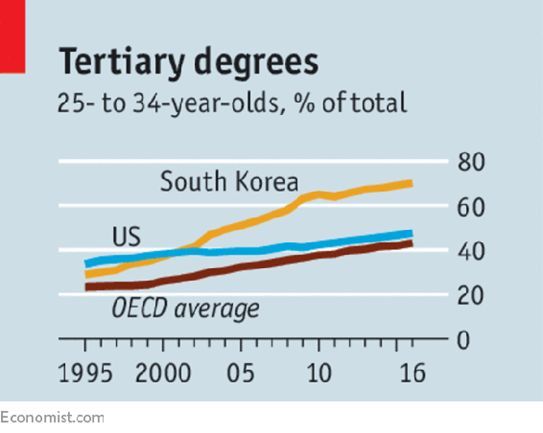School-leavers need other ways to learn and train besides going to university
Feb 1st 2018
THERE are plenty of good reasons for a young person to choose to go to university: intellectual growth, career opportunities, having fun. Around half of school-leavers in the rich world now do so, and the share is rising in poorer countries, too.
Governments are keen on higher education, seeing it as a means to boost social mobility and economic growth. Almost all subsidise tuition—in America, to the tune of $200bn a year. But they tend to overestimate the benefits and ignore the costs of expanding university education. Often, public money just feeds the arms race for qualifications.
年轻人选择去上大学有很多可以理解的理由:增长智慧,职业发展,比较好玩。发达地区一半的高中毕业生选择上大学,贫困地区这个比例也在增长中...
As more young people seek degrees, the returns both to them and to governments are lower. Employers demand degrees for jobs that never required them in the past and have not become more demanding since. In a desperate attempt to stand out, students are studying even longer, and delaying work, to obtain master’s degrees. In South Korea, a country where about 70% of young workers have degrees, half of the unemployed are graduates.Many students are wasting their own money and that of the taxpayers who subsidise them.
Spending on universities is usually justified by the “graduate premium”—the increase in earnings that graduates enjoy over non-graduates. These individual gains, the thinking goes, add up to an economic boost for society as a whole. But the graduate premium is a flawed unit of reckoning. Part of the usefulness of a degree is that it gives a graduate jobseeker an advantage at the expense of non-graduates. It is also a signal to employers of general qualities, such as intelligence and diligence, that someone already has in order to get into a university. Some professions require qualifications. But a degree is not always the best measure of the skills and knowledge needed for a job. With degrees so common, recruiters are using them as a crude way to screen applicants. Non-graduates are thus increasingly locked out of decent work.
flawed: having a mistake, fault, or weakness
locked out of decent work
In any case, the premium counts only the winners and not the losers. Across the rich world, a third of university entrants never graduate. It is the weakest students who are drawn in as higher education expands and who are most likely to drop out. They pay fees and sacrifice earnings to study, but see little boost in their future incomes. When dropouts are included, the expected financial return to starting a degree for the weakest students dwindles to almost nothing. Many school-leavers are being misled about the probable value of university.
Governments need to offer the young a wider range of options after school. They should start by rethinking their own hiring practices. Most insist on degrees for public-sector jobs that used to be done by non-graduates, including nursing, primary-school teaching and many civil-service posts. Instead they should seek other ways for non-graduates to prove they have the right skills and to get more on-the-job training.
dwindle: to gradually become smaller
政府部门应该给高中毕业生更多的选择,而不仅仅是大学
School-leavers should be given a wider variety of ways to gain vocational skills and to demonstrate their employability in the private sector. If school qualifications were made more rigorous, recruiters would be more likely to trust them as signals of ability, and less insistent on degrees. “Micro-credentials”—short, work-focused courses approved by big employers in fast-growing fields, such as IT—show promise. Universities should grant credits to dropouts for the parts of courses they have completed. They could also open their exams to anyone who wants to take them, and award degrees to those who succeed.
Mutually assured instruction
Such measures would be more efficient at developing the skills that boost productivity and should save public money. To promote social mobility, governments would do better to direct funds to early-school education and to helping students who would benefit from university but cannot afford it. Young people, both rich and poor, are ill-served by the arms race in academic qualifications, in which each must study longer because that is what all the rest are doing. It is time to disarm.
很多短平快的课程在一些高速发展的行业是适用的,像IT行业就证明了,学习三个月-半年的课程,即可进入工作!
发达和不发达国家的年轻人都被这种学位教育比赛给耽误了,他们花更长的时间去学习获取学位仅仅因为是剩下的所有人都这么做,是时候要改变了!
总结:有没有实际的技能,拿出来溜溜就知道了,而不是拿出一张学位证书
--------------------------------------------------------------------------------------------------------------------
Results
Lexile®Measure: 1000L - 1100L
Mean Sentence Length: 16.70
Mean Log Word Frequency: 3.37
Word Count: 618
这篇文章的蓝思值是在1000-1100L, 适合英语专业大一的水平学习,是经济学人里最简单的
使用kindle断断续续地读《经济学人》三年,发现从一开始磕磕碰碰到现在比较顺畅地读完,进步很大,推荐购买!点击这里可以去亚马逊官网购买~
